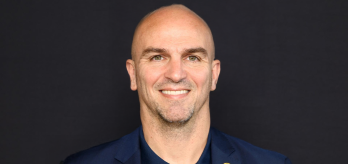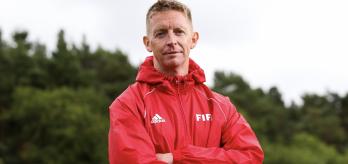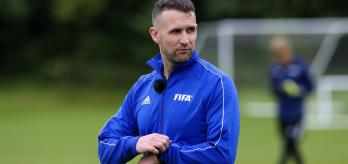Part 1 - Introduction and falling in love with the game
00:06
Aidy's career path
Aidy started his coaching journey early. At the age of 19, he acquired his preliminary coaching license at Huddersfield. His work with the English FA is a key highlight in his career as it helped him refresh his coaching knowledge.
04:17
Inspirations
England's captivating performances at the 1990 FIFA World Cup Italy™, UEFA Euro 1996™ and UEFA Euro 2020™ have inspired Aidy to make a difference in the footballing world. Many managers over the years have inspired Aidy, and he takes the best aspects of each and applies them to his own game.
Part 2 - The manager and coach
00:07
Role of the modern manager
Although a manager's role can vary depending on the level, Aidy sees picking the team and having an input in recruitment as two core responsibilities of every head coach. A top club has an excellent recruiting system, excellent coaching pathway and a manager or coach who is brave enough to play young players.
01:02
Issues facing the modern manager
Social media and the media more generally can create challenges for the modern manager. It takes a strong person to remain focused on the footballing project amid all these distractions. With the influx of voices social media brings, coaches need to be able to filter out the valuable opinions from the bad ones.
01:47
The constants and potential changes to come in management
People skills will always be necessary for getting to know the person behind the player. Having a staff with a diverse range of opinions and skill-sets is also still important. The way people recruit, the need to manage upwards and the need to manage the media are some of the ways management may change in the coming years.
02:53
The innovators in coaching today
Pep Guardiola, Jürgen Klopp, Chris Wilder and the Red Bull football teams are all regarded by Aidy as innovators in coaching today. There isn't one way to play the game; tactical trends change over time. It is important to go against the trends every now and then. Crossing is an example of something that has faded from the game that may come back in a new form.
04:13
Top tips for a manager or head coach
Managers should listen to the expertise of other specialists that form the coaching staff. These specialists should work in tandem with coaches, physios and the medical department. Another crucial tip is aligning recruitment, training and playing style.
Part 3 - Leading
00:06
What to look for in a player
For Aidy, the ideal player is someone with a character and a love of the game. They should also be willing to work with other people. To improve, the player must possess a growth mindset.
01:06
Aspects of effective leadership
Listening is a crucial element of leadership. By listening to players and staff, coaches can build deeper understanding between themselves and those they work with. With this deeper understanding, the staff and players that work with the coach are more likely to go the extra mile.
02:04
Aidy on his type of leadership
Aidy sees his type of leadership as inclusive, filled with humour and stable. He stresses the importance of working hard and having an understanding between himself as the coach and the staff and players. This collective effort makes a world of difference; Aidy draws from his experience helping Watford get promoted to the premier league as a key example of this.
Part 4 - Motivating players
00:06
How to motivate players and staff
To motivate players, Aidy recommends finding out about their identity, background and tapping into their personal relationship with football: what are the things that make them play with joy?
01:03
Environment for players
In a football environment, all its members need to be aware of the common objectives of the group. For example, if a team is after a top-four finish, then all those involved in the process must be aware.
Part 5 - Coaching club v coaching country
00:05
The differences between managing clubs and national teams
Time is the most significant difference between managing a club and a national team. With a national team, you only have allocated windows to manage, whereas a coach has a majority of the year at a club. At the national team level, a coach has a squad of players with different ways of playing the game. Getting these players to conform to one style is crucial for the national team coach.
Part 6 - The future
00:08
The next tactical trend
Aidy points out that football is cyclical and some contemporary tactical trends already featured in previous eras. By looking into the past, coaches can predict the nature of tactical elements to come in the future.
01:32
Aspects of a top player in 10 years' time
A player will still require a good character and an eagerness to improve. Additionally, players will be required to cope with the physical demands of a 12-month season. Technical efficiency is also a fundamental skill for players in the future. Lastly, a solid tactical understanding will become increasingly important.
02:09
Coaching players in 10 years' time
Aidy praises the level of diversity in English football and the amount of technically gifted players. Playing standard as a whole will have risen. Game-specific training is crucial for reaching the standard you have set for yourself.
How you recruit, how you train, how you play - I think it's all got to be in alignment

























